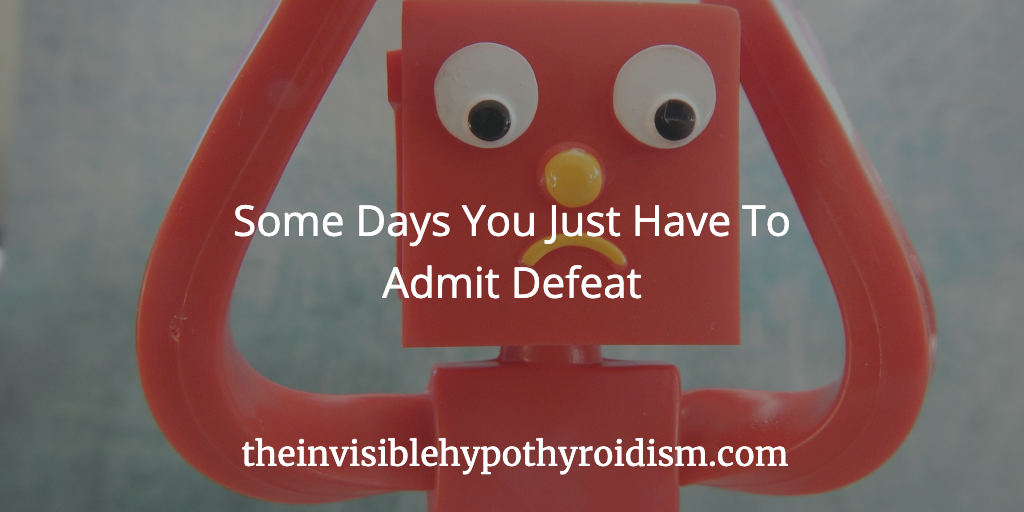Originally published on 12th March 2018 Last updated on 11th March 2024
Although I’m not one who likes to dwell on the negatives or things that I cannot change or have not much control over, sometimes I do have to admit defeat and “give in” to my health conditions.
After all, a big part of living with thyroid disease has, for me at least, included knowing when to just stop and listen to my body.
I usually prefer to look at how having hypothyroidism and Hashimoto’s have changed me for the better, taught me things or otherwise helped develop me as a person. But today, I just had to admit defeat to them and put off today’s plans until tomorrow.
After all, not every day is a good one.
* * *
Lying awake in the early hours of the morning, I’d been trying to sleep for hours but had had no luck.
I felt physically tired, my body heavy and eyes drooping, but my mind wasn’t switching off. I didn’t have racing thoughts, anxiety or worries for once, but it just wasn’t calming down for sleep. I got up several times, tried a hot drink, a snack, reading a book, but it was just another one of those nights. Tired but wired, thanks endocrine system for the confused state my body is in.
My alarm goes off for work at 6:30am, after just a couple hours of sleep. Like a zombie, I slowly reach for my phone, turning off the alarm, then popping my BBT thermometer into my mouth to take my temperature. I take it every morning to track my cycle due to sex hormone imbalances. Tracking it helps me to see what they’re doing and if the imbalance is resolving itself (it’s got steadily better over the last year or so).
After taking my temperature and recording it on my phone, which tells me it’s a normal reading, I take my thyroid medication, before my head hits the pillow again in a daze.
As I try to keep my eyes open and focus on the text on my phone long enough to try and wake me up, my eyelids fight back. Trying to keep them open is a conscious effort. The room spins and my body feels heavy, but I don’t want to call in to work sick today.
I decide to set my alarm for two hours time and go in to work a bit later, making up my hours another day when I feel well enough. My head crashes back to the pillow and although my eyelids can now safely close, I can’t sleep. Waiting for the alarm to go off at 9am, when I know that I’ll have to make that call saying I’ll be in a little later, I fill with anxiety. Anxiety over the alarm going off and startling me awake from sleep again but also anxiety for needing to call my manager and explain why I can’t turn up on time like a regular person. And so, the alarm goes off at 9am and I’ve had no more sleep and feel no more better than at 6:30am.
For ten minutes, I play with the idea of just calling in sick today and taking the day off, but I’m stubborn and one of my biggest ‘fears’ is failure. Imperfection. Admitting defeat.
My husband suggests I take the day off and gives me encouragement that I can indeed make the call to tell them, but as a colleague answers the phone, I tell them I will be in a couple of hours later due to poor sleep from my health conditions. I sense no judgement in their voice – I feel proud. I can do this.
I stand up and my feet feel swollen although they look how they always do. As I wash my face in the bathroom, I notice how deep the bags around my eyes are and that the whites of my eyes are pink. Make-up will help with that I tell myself. I want to throw on some baggy jeans and a hoodie, but decide that today, I will take back some control and wear a more presentable, well-put-together outfit. Now dressed, I smile in the mirror at how ‘normal’ I look.
Making my way downstairs, I move carefully so as not to trip or slip from feeling faint and I take my seat in front of the window to do my make-up. “Why bother?” you may ask when I’m clearly not very well. Because being able to take pride in how I present myself, just as I did before I developed these health conditions, gives me a huge sense of control and independence, despite what these health conditions take away from me on days such as this.
In just ten minutes, I’ve done my make-up and brushed my hair and with my well thought out outfit, I look normal. For the first hour of the day I have managed to convince myself that I am like everyone else.
After packing food in to my bag for lunch, I leave the house, locking the front door and feeling accomplished. Sure, I’ll be at work two hours later than I should be but at least I’ll be there. And I won’t have work mounting up or people waiting on me for another day before things can be done.
But three minutes in to my fifteen minute walk to the tram stop, a wave of shock hits me.
As I grab on to someone’s front garden wall, I almost pass out from overwhelming fatigue, weakness and nausea. Thank you adrenal dysfunction.
Scrunching my eyes tightly closed and taking deep breaths, I try to stabilise my body to the point that the brick wall is digging in to my tightly gripping hands. And although I can feel the brick creating cuts on my palms, the nausea and faintness I feel is so much worse. Immediately, I turn and make my way back home, trying to see through blurry vision and swaying images. I’m scared I’ll collapse there and then in the street.
My phone pings with a message from my husband who had left for work an hour earlier, saying ‘I hope you’re OK’, as if he knows at that moment I’m close to passing out. I try to focus on sending him a message back, ‘Heading home’, I type as I put one foot in front of the other. Something to focus on as everything spins around me.
I may have walked three minutes down the road before being stopped in my tracks, but this walk back is going on and on as I focus on my house, yet it seems to stretch out further in to the distance the more steps towards it I take. I’m going to throw up, I say to myself.
I reach the front door, keys shaking in my hand and as I unlock it, I fall through and on to the bottom step of the stairs inside. Seeing black spots and noticing the bumpy texture of the carpet under my hands, within a few minutes I come back around. I feel foggy headed and dazed but safe.
And so I had to admit defeat today. At various points this morning – getting out of bed, having a wash, getting dressed, putting makeup on, getting my lunch together and even leaving the house – I could have said no and decided to stay home.
I’d have been very entitled to make that decision.
But I, perhaps stupidly, tried my best to make it to work today, when it just wasn’t going to happen.
I’m home now and actually feel OK about missing work. Frustrated? A little. Feeling like a failure? I actually don’t for once.
I really tried this morning, I really did. And I take comfort in that. Some days your body just needs to rest, and it’s OK to rest.
Do you ever feel like this?
See also: Thyroid Patients Explain How Their Thyroid Condition Has Affected Their Work Life
Please remember that if you’re a thyroid patient living with poor mental health or lingering physical symptoms, that you don’t have to live this way. To address why you may still be feeling unwell (often despite being on thyroid medication too), please see this article and go through each suggestion, putting your thyroid jigsaw back together.
See also:
The book Be Your Own Thyroid Advocate: When You’re Sick and Tired of Being Sick and Tired, which builds on this article in detail.






